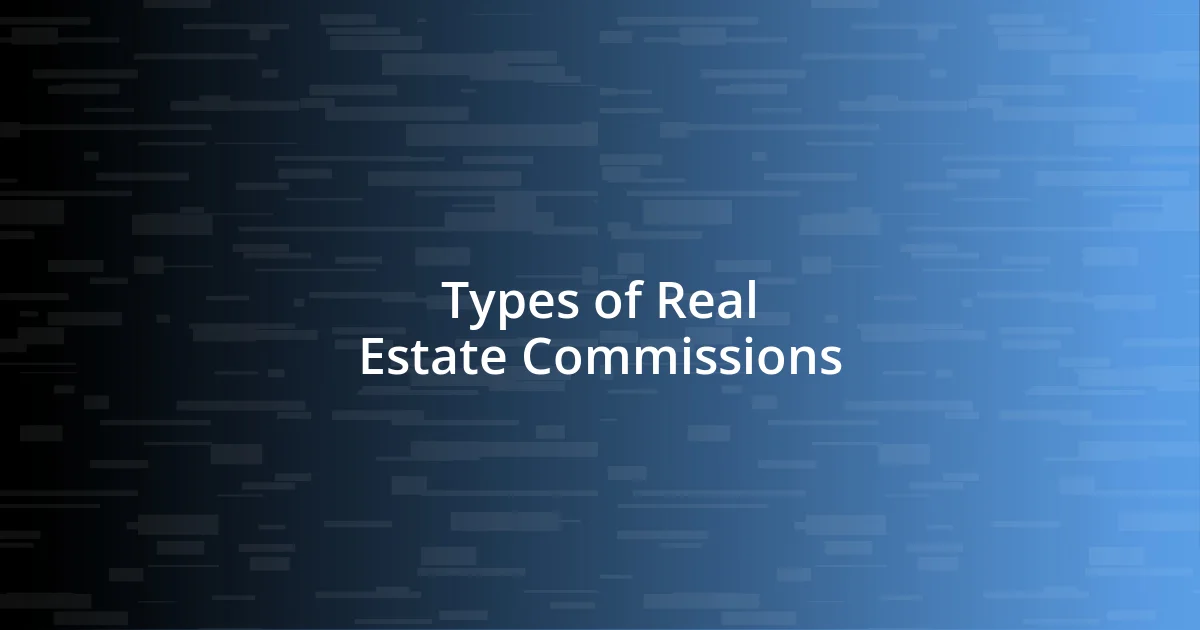Key takeaways:
- Understanding the split of real estate commissions (typically 5-6%) between buyer’s and seller’s agents is crucial for both parties to feel valued and engaged in negotiations.
- There are various commission structures, including flat-fee, tiered, hourly, and retainer fees, each of which can significantly impact both buyers’ and sellers’ financial outcomes.
- Open communication about commissions and negotiating flexibility with agents can foster a sense of partnership and lead to better financial agreements for clients.

Understanding Real Estate Commissions
Real estate commissions often seem like a complex maze to navigate. I remember my first experience buying a home; I was surprised to learn that the agent’s commission typically ranges from 5% to 6% of the property’s sale price. It made me wonder, what exactly do I get in return for those fees?
When I finally took the plunge to sell my own property, understanding the breakdown of the commission really opened my eyes. For instance, the commission is usually split between the buyer’s and seller’s agents, which can leave both parties feeling a bit shortchanged. It made me appreciate the negotiation and effort that goes into securing the best deal.
I often reflect on how much the commission structure influences the dynamics of a real estate transaction. Have you ever felt hesitant to ask an agent tough questions because you were aware of that commission hanging over the conversation? I know I did! It’s essential to understand these nuances so you can engage confidently and ensure that both your needs and the agent’s efforts are aligned.

Types of Real Estate Commissions
When I first started delving into real estate, I discovered there are several types of commission structures that can vary significantly. The standard percentage-based commission is probably the most familiar to most people, but there are alternative options that can better fit certain situations. For example, some agents offer flat-fee commissions, which provide a set price regardless of the property’s sale price. This option can be particularly appealing if you’re selling a high-value property, like the one I sold a few years back.
Here’s a breakdown of common types of real estate commissions:
- Percentage-based Commission: Typically between 5% to 6% of the sale price, split between the buyer’s and seller’s agents.
- Flat Fee Commission: A predetermined amount charged for the agent’s services, regardless of the property’s value.
- Tiered Commission: A sliding scale where different portions of the sale price are charged at different commission rates.
- Hourly Fees: Some agents charge based on the time they spend on your transaction, which can be useful for specific services rather than full representation.
- Retainer Fees: An upfront fee paid to retain the agent’s services, often combined with a reduced commission rate at closing.
Reflecting on my own experiences, it was surprising to see how different structures could impact my financial equity. The tiered approach was quite interesting too; I remember calculating how much I could save by negotiating a lower rate for the higher segments of my home’s price. It felt empowering to take an active role in understanding these options!

How Commissions Affect Buyers
When I think about how real estate commissions impact buyers, one memory stands out. I remember a friend of mine who was house hunting but couldn’t shake the feeling that commissions were pushing her budget to the limit. With an agent’s fee potentially adding thousands to the overall cost, it struck her that this fee could limit her options. It’s frustrating to think of how that slice of the pie could prevent someone from getting their dream home.
In my own journey, I noticed how the commission structure affected my agent’s motivation. Knowing they were reliant on that percentage made me question their recommendations at times. Were they truly suggesting the best homes for me, or were they focused on properties that would pad their own pockets? This aspect really highlights the importance of transparent communication with your agent. Being clear about expectations can lead to a more satisfying experience for everyone involved.
I also found that some agents were willing to negotiate their commission rate. When I bought my multifamily home, I brought this up during our first meeting. It turned into a candid discussion, and I felt empowered advocating for my financial interests. By negotiating, I was not only protecting my budget but also fostering a sense of partnership with my agent. In my experience, it’s always worthwhile to have those open conversations about commissions; they might just lead to better outcomes for everyone.
| Commission Type | Impact on Buyers |
|---|---|
| Percentage-based Commission | Can increase the overall cost, limiting budget options. |
| Flat Fee Commission | Provides predictability, but may lack motivation for agents. |
| Tiered Commission | Encourages negotiation but requires understanding of potential savings. |

How Commissions Affect Sellers
I remember the day I decided to sell my first home and the commission question loomed large in my mind. As I calculated how much I would ultimately walk away with, the reality of a 6% commission hit hard—was I really willing to give away that much of my hard-earned equity? It felt disheartening to think that a chunk of my sale would vanish, just like that.
In another instance, I met with an agent who boasted about their experience but had a commission rate that left me feeling uneasy. Their enthusiasm to sell my property was palpable, yet I wondered if that eagerness stemmed from how much I was paying them. Have you ever felt torn between wanting a broker’s expertise and the financial implications tied to their commission? It was a delicate balance, realizing my agent’s income was tethered to my selling price, which sometimes made me second-guess their advice.
There was a moment during negotiations when I realized I needed to advocate for my interests more fiercely. I asked my agent about the possibility of a reduced rate due to my home’s unique features. Surprisingly, they agreed, and it was such a relief to see how open they were to the conversation. It made me think—how often do sellers feel uncomfortable discussing commissions? Being transparent about these costs can not only save money but solidify a cooperative relationship. It’s a powerful reminder that, in real estate, your voice truly matters!

Negotiating Real Estate Commissions
When it comes to negotiating real estate commissions, the first step is often opening the dialogue with the agent. I remember feeling a mix of apprehension and determination the first time I broached this topic. Just asking if there was flexibility in their fee gave me a sense of empowerment—I was in control of my financial future. Have you ever felt that rush of confidence when you advocate for your needs?
During one negotiation, I discovered that highlighting my readiness to buy could influence the commission discussion positively. I told my agent that I was prepared to move quickly, which made them reconsider their fee structure. It was a revelation for me that agents don’t always have a “one-size-fits-all” commission; a little persistence and insight can pave the way for a better deal. This experience reinforced the idea that being an informed buyer can shift the dynamics in negotiations.
I’ve found that being transparent about my budget also played a critical role in these discussions. Once, I candidly explained my financial constraints to an agent, which opened up a new level of understanding between us. By doing this, I wasn’t just another client; I was someone with genuine limitations and needs. How often do we walk into negotiations with our cards close to our chest? I learned that it truly pays to show vulnerability, as it can foster a much more collaborative relationship.

My Personal Commission Experience
I can’t forget that first home sale experience when my agent proposed a 5% commission rate, which felt like a gut punch. As I stared at the numbers, a sense of frustration washed over me. Was I really prepared to hand over such a significant portion of my profits? It dawned on me that understanding this part of the transaction was crucial, and I rather wanted to feel like I was making an informed decision, rather than just agreeing to the standard.
One situation stands out in my mind: after a long back-and-forth over fees, I bravely opened up about my own financial struggles. It wasn’t just about dollar signs but about the sacrifices I had made to get to this point. That conversation allowed my agent to see me as more than a transaction. It sparked a partnership where we were both invested in the outcome. Don’t you think it’s important for agents to acknowledge the sellers’ stories to create a more authentic connection?
With time, I learned the art of using my knowledge about market dynamics as leverage in commission discussions. I recall a deal where I educated myself on the neighborhood’s selling trends and brought that data to the table. This approach opened my agent’s eyes to the potential for a reduced commission due to market competitiveness. It’s funny how arming yourself with the right information can shift the balance of power in negotiations. Have you ever experienced that thrill of feeling knowledgeable in a discussion? It’s liberating!

Lessons Learned from My Experience
There’s something incredibly eye-opening about tracking the work your agent puts in for the commission they request. I remember sitting down after my first sale and reflecting on the countless hours my agent devoted to marketing my home. At one point, I thought to myself, “Is this commission I’m paying truly justified by the effort?” It prompted me to closely assess the value of the services provided, and I realized that not all agents deliver the same level of commitment.
One crucial lesson I absorbed was the necessity of aligning with an agent who understands my goals. After switching to a different agent who actively sought my input during the sales process, I felt a stronger sense of collaboration. I asked, “What is the plan moving forward?” This open line of communication helped me feel more involved, and my overall experience improved as a result. Don’t you think having that connection with your agent can make all the difference?
I also learned the importance of setting clear expectations from the outset. In my second experience, I laid out what I hoped to achieve regarding commission rate, and my agent subsequently tailored their strategy accordingly. By being upfront about my preferences and objectives, it fostered a sense of mutual respect. How often do we step into negotiations without outlining our needs? I realized that clarity not only protects my financial interests but also strengthens trust, creating a smoother relationship with my agent.














